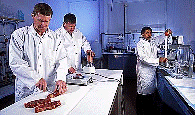United States Department of Agriculture: Agricultural Research Service, Lincoln, Nebraska

Roman L. Hruska U.S. Meat Animal Research Center: Reports
Date of this Version
1988
Document Type
Article
Abstract
Disease is caused by successful invasion of pathogenic organisms (e.g., viruses, bacteria, parasites). The immune system is responsible for the protection of an individual against these invasions. This system is complex, with interconnective parts composed of many stimulators, inhibitors, effectors, and consequences. Immunity that is dependent upon antibodies or immunoglobulins can be either active or passive in origin. In active immunity, the body produces protecting antibodies in response to a naturally occurring infection or to vaccination against a pathogenic organism. Vaccination will prime the animal's immune system for a faster and more effective response to later infections. In passive immunity, temporary protection against infection results because of the transfer of immune products from a resistant to a susceptible individual. Passive immunity occurs between mother and young via transfer of immunoglobulins across the placenta to the developing fetus and/or by ingestion of immunoglobulin-containing colostrum. In ruminants, placental transfer of maternal antibodies does not occur due to the complexity of the placenta. The animal is born with a negligible level of immunoglobulins unless fetal infection has occurred. However, this is compensated for by absorption of large protein molecules, including immunoglobulins, from colostrum across the intestinal wall of the neonate. The absorptive mechanism is short-lived, lasting only 24 to 36 hr after birth, and absorption capacity decreases over time. Catabolism of these proteins eventually occurs in the body. Therefore, we believe maternal immunoglobulins are gone by 3 to 4 mo of age. As level of maternal antibodies declines, the animal's own immune system takes over the role of protection. Responses to natural infection and vaccination begin. Thus, both types of immunity are necessary for the well-being of the ruminant animal.
One approach to reducing losses due to disease is to increase genetic disease resistance. Improvement of genetic resistance requires identification of genetically superior animals and dissemination of their genes by preferential mating. However, before a clear definition of immune superiority is possible, factors that affect immune traits must be defined.
The first part of this study investigated the ability of calves to acquire and absorb colostral antibodies. The second part of this study investigated the animals' active immunity, specifically the vaccination response to infectious bovine rhinotracheitis virus (IBRV). Factors affecting these immune traits were examined, and heritabilities of these traits were estimated.


Comments
Published in Beef Research Program Progress Report (1988) No. 3: 22-23